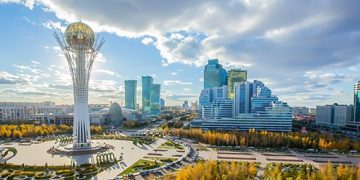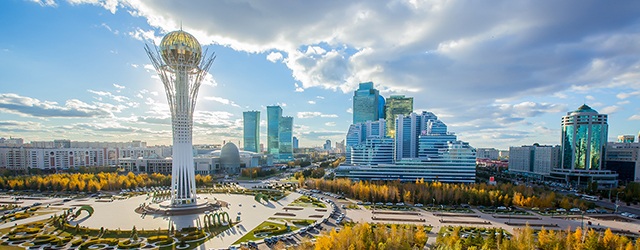Riaz Ahmed Malik
Despite weak regional economic future and weak global economy the Republic of Kazakhstan has already surpassed all the regional economy in terms of GDP, GNP, inflation and LSM etc. which shows that constant structural reforms have further strengthened its economy, civility and production channels. Moreover, New Kazakhstan has revolutionized its outlook and future prospects.
According to Asian Development Bank (March 2022), Kazakhstan’s GDP expected to grow by 3.2 percent in 2022 and 3.9 percent in 2023. On the other hand, Kazakhstan’s inflation rates forecasted at 7.8 percent in 2022 and 6.4 percent in 2023. Whereas, per capita GDP growth for Kazakhstan is expected at 1.9 percent in 2022 and 2.6 percent in 2023.
According to Kazakh Minister of National Economy Alibek Kuantyrov (April 2022) Kazakhstan’s GDP growth accelerated to 3.5 percent in the first two months of 2022. He shared that the real sector became the driver of sustainable economic growth.
During this period, the main trends were accelerated growth in the real sector, rebounded growth in trade and communications after the decline in January 2022 and the dynamic growth of investments in the non-extractive sector. In January and February, growth in the real sector was 4.7 percent. The service sector grew by 2.1 percent said by the minister Kuantyrov.
Furthermore, industrial production observed a 4.7 percent growth, including a 3.9 percent growth in manufacturing. Among other industries that saw a notable increase are a pharmaceutical industry (17 percent), clothing manufacturing (12.8 percent), and machine building (9.2 percent).
According to the minister, the mining industry shows strong growth of 6.4 percent due to an increase in oil production by 9.2 percent, natural gas by 8.9 percent, and metal ores by 1.2 percent.
The Akmola and Pavlodar regions and Nur-Sultan city showed progress across all major macroeconomic indicators, but the Aktobe and Mangistau regions in western Kazakhstan lagged behind all regions.
Kazakh Prime Minister Alikhan Smailov stressed that it is important to maintain and accelerate the economic growth in the coming months amid what he described as “today’s difficult conditions.”
“It is necessary to strengthen the work to increase people’s incomes, create jobs and diversify the economy,” said Smailov, noting that the government prepared an action plan for 2022.
He instructed his government and local officials to work on stabilizing the prices for socially significant goods, days after disinformation about the alleged shortage of sugar made people rush to stores to buy up the supply leading to sugar disappearing from shelves.
Given the rapidly changing situation in specific markets, Smailov also stressed that efforts to control and curb inflation would be strengthened.
In this connection, Kazakhstan’s National Economic Minister Alibek Kuantyrov has revealed the national Q1 2022 main economic growth indicators. These show that in January-March this year the country’s economic growth rates reached 4.4%. Kuantyrov reported on the growth acceleration in the country’s real economy, onward growth in exports, and sustainable growth rates in the service industry. Growth in the real economy reached 5.9%, while business activity increased 2.8%.
Fixed investment grew by 1.5%, while Capital investments, excluding the mining industry, grew by 0.6%. Investments into construction rose by 2.2. times, into education by 2.2 times, public administration, and social services by 78.5%.
The main growth drivers were in Kazakhstan’s Shymkent, one of the countries main economic hubs, Akmola Province, which includes the capital Nur-Sultan, (previously Astana) and the Pavlodar Province to the North-East, near the border with Russia.
In January-February, Kazakhstan’s foreign trade turnover increased by 53% to reach US$18.2 billion. Exports grew by 71.4% to US$12.1 billion, with Kazakhstan’s processed goods exports rising by 47% to hit US$3.5 billion.
The figures are inflated partially by a huge effort in repaired damaged infrastructure caused by the early January 2022 social unrest, however political reforms made since then appear to have calmed the country down and put it back on the path to normal trade stability. The economy is also benefitting from a sudden influx of Russian investment and money coming into the economy with capital relocating from Russia due to the Ukraine conflict.
Nevertheless, the Prime Minister of the Republic of Kazakhstan Alikhan Smailov shared the updated Forecast of the socio-economic development of the Republic of Kazakhstan for 2022-2026 and the republican budget for 2022-2024 was approved. Ministers of National Economy of the Republic of Kazakhstan Alibek Kuantyrov, Ministers of Finance Cerulean Zhamaubayev made presentations.
At the meeting, an updated Forecast of macroeconomic indicators for the current year was presented, taking into account the current global political and economic situation.
According to the Ministry of National Economy, taking into account the current situation, the country’s real GDP growth has been reduced from 3.9% to 2.1%. Nominal GDP is expected to be 91.5 trillion tenge, which is 4.5 trillion tenge higher than the approved forecast. According to forecasts, exports will increase to $72.2 billion, imports up to $40.2 billion. Inflation is defined in the corridor of 8-10%.
It should be noted that the draft republican budget, first of all, is aimed at the full and timely fulfillment of all social obligations of the state, as well as ensuring the high-quality and sustainable development of the economy in the current conditions.
According to the Ministry of Finance of the Republic of Kazakhstan, the income of the republican budget (excluding transfers) in 2022 is estimated at 10,162 billion tenge, which is 955 billion tenge higher than the approved plan. It is proposed to determine the expenses of the republican budget in the amount of 18,795 billion tenge with an increase of 2.7 trillion tenge relative to the adjusted volume.
The Prime Minister of the Republic of Kazakhstan announced that the size of the guaranteed transfer from the National Fund will be adjusted to ensure the balance of the republican budget.
“Additional expenses will be directed to the implementation of the instructions of the Head of State K. Tokayev in January this year, at the expanded meeting of the Government and within the framework of the new Message to the people of Kazakhstan, as well as to fulfill the previously accepted urgent obligations,” Smailov assured.
The funds are planned to be used to restore state property and urban infrastructure after the January events, ensure financial and economic stability, as well as support the population, business and the real sector of the economy.
To conclude, the macro-economy of Kazakhstan is under stress due to ongoing Russia-Ukraine conflict. There is slid reduction in remittances from Russia and FDI from the EU because of unending conflict in the region. However, the government of Kazakhstan and its policy makers has decided to further diversify its macro-economy shifting from oil to non-oil sector especially in services, real estate, tourism and SMEs.
(The author is
Joint Editor of Daily National Herald Tribune, Islamabad)





